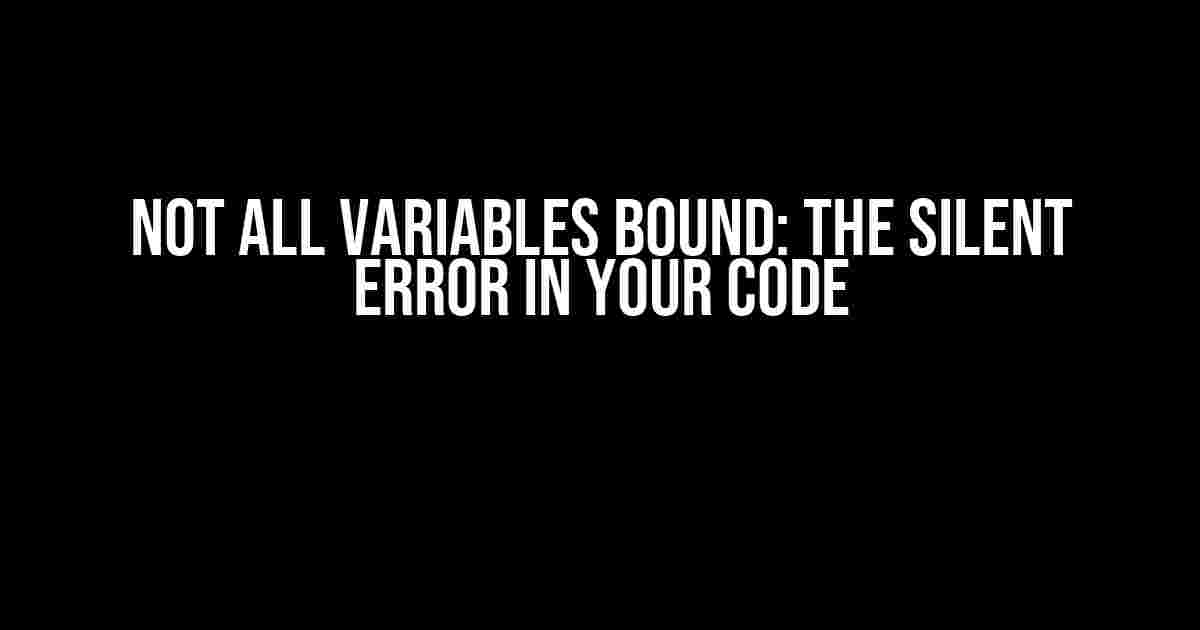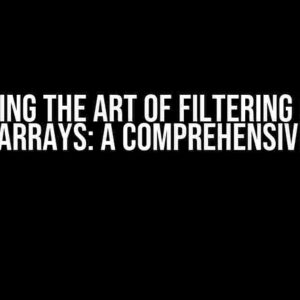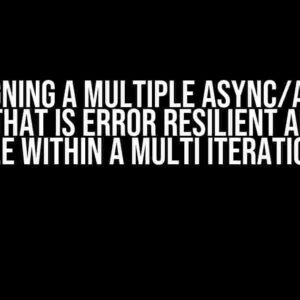As a developer, you’ve likely encountered the frustrating error message “Not all variables bound” at some point in your coding journey. It’s a cryptic message that can be difficult to decipher, leaving you scratching your head and wondering what on earth is going on. But fear not, dear coder, for today we’re going to dive deep into the world of bound variables and uncover the secrets behind this perplexing error.
What Does “Not All Variables Bound” Mean?
Before we can solve the problem, we need to understand what’s causing it. When you see the “Not all variables bound” error, it means that one or more variables in your code are not properly defined or initialized. In other words, the compiler or interpreter is telling you that it doesn’t know what to do with the variables because they’re not bound to a specific value or scope.
Variables 101: A Quick Refresher
Variables are an essential part of programming, allowing you to store and manipulate data in your code. There are three main types of variables:
Local variables: These are variables declared within a function or block and are only accessible within that scope.Global variables: These are variables declared outside of any function or block and are accessible throughout the entire program.Parameter variables: These are variables passed as arguments to a function and are only accessible within that function.
The Causes of “Not All Variables Bound”
Now that we’ve refreshed our knowledge of variables, let’s explore the common causes of the “Not all variables bound” error:
-
Undefined variables: This is the most common cause of the error. If you’re trying to use a variable that hasn’t been declared or initialized, the compiler will throw the “Not all variables bound” error. -
Scoping issues: If you’re trying to access a variable outside of its declared scope, you’ll get the error. For example, trying to access a local variable outside of its function. -
Typo or syntax errors: A simple typo or syntax error can cause the compiler to throw the “Not all variables bound” error. Make sure to double-check your code for any mistakes. -
Missing or incorrect imports: If you’re using external libraries or modules, ensure you’ve imported them correctly. Otherwise, the compiler won’t recognize the variables and will throw the error.
Debugging “Not All Variables Bound”
Now that we’ve identified the causes, let’s dive into the steps to debug and fix the error:
Step 1: Check for Undefined Variables
function myFunction() {
console.log(x); // x is not defined
var x = 10;
console.log(x); // x is now defined
}In the above example, the first console.log(x) will throw the “Not all variables bound” error because x is not defined. To fix this, simply move the var x = 10; declaration above the first console.log(x) statement.
Step 2: Review Scoping
function myFunction() {
var x = 10;
if (true) {
console.log(x); // x is accessible within the if block
}
console.log(x); // x is still accessible outside the if block
}
console.log(x); // x is not accessible outside the functionIn this example, x is accessible within the if block and outside the if block within the function, but it’s not accessible outside the function. Make sure you’re not trying to access variables outside of their declared scope.
Step 3: Check for Typo or Syntax Errors
function myFuntion() {
var x = 10;
console.log(x);
}In this example, the typo in the function name (myFuntion instead of myFunction) will throw the “Not all variables bound” error. Make sure to double-check your code for any mistakes.
Step 4: Verify Imports
import React from 'react';
function myComponent() {
return <div>Hello World!</div>;
}In this example, if you’re using React, make sure to import it correctly at the top of your file. Otherwise, the compiler won’t recognize the React variables and will throw the “Not all variables bound” error.
Best Practices to Avoid “Not All Variables Bound”
By following these best practices, you can avoid the “Not all variables bound” error and write more efficient, error-free code:
| Best Practice | Description |
|---|---|
| Declare variables at the top of your script | Declaring variables at the top of your script helps to avoid scoping issues and ensures that variables are accessible throughout the code. |
| Use meaningful variable names | Using meaningful variable names helps to avoid typos and makes your code more readable. |
| Initialize variables before use | Initializing variables before use ensures that they’re not undefined and helps to avoid the “Not all variables bound” error. |
| Use a linter or code editor with syntax highlighting | Using a linter or code editor with syntax highlighting helps to catch syntax errors and typos before they become a problem. |
Conclusion
The “Not all variables bound” error can be frustrating, but by understanding the causes and following the steps to debug and fix the error, you’ll be well on your way to writing error-free code. Remember to declare variables at the top of your script, use meaningful variable names, initialize variables before use, and use a linter or code editor with syntax highlighting to catch errors before they become a problem.
With these best practices and a solid understanding of variables, you’ll be able to tackle even the most complex coding challenges with confidence. So, the next time you encounter the “Not all variables bound” error, don’t panic – simply follow the steps outlined in this article and you’ll be back to coding in no time!
Here are 5 Questions and Answers about “Not All Variables Bound” in a creative voice and tone:
Frequently Asked Question
Get the lowdown on “Not All Variables Bound” and become a master debugger!
What does “Not All Variables Bound” mean?
This error occurs when a query or procedure tries to access a variable that hasn’t been properly initialized or defined. Think of it like trying to use a magic wand without first saying the magic words – it just won’t work!
How do I fix “Not All Variables Bound” in my SQL query?
First, identify the problematic variable and make sure it’s properly declared and initialized. Check your query for any typos or missing keywords. If you’re still stuck, try breaking down your query into smaller parts to pinpoint the issue.
Can “Not All Variables Bound” occur in other programming languages besides SQL?
Yes, this error can occur in other programming languages, such as Python, Java, or C++, whenever a variable is used before it’s been initialized or defined. So, always make sure to initialize those variables before using them!
Is “Not All Variables Bound” a critical error?
While it’s not a catastrophic error, it can still cause problems with your application or query. It’s essential to address the issue promptly to avoid errors, data corruption, or even security vulnerabilities.
How can I prevent “Not All Variables Bound” from happening in the future?
Develop good coding habits! Always declare and initialize variables before using them, and use debugging tools to catch errors early on. Code reviews and testing can also help identify potential issues before they become problems.




